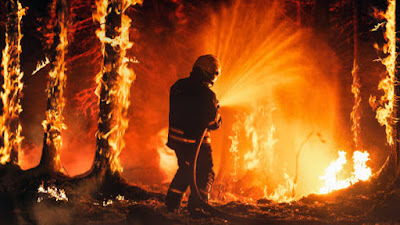
Show empathy, support others, and demonstrate resilience during the crisis.
Years ago, many of my friends and neighbors experienced the devastating impact of 70-mile-per-hour Santa Ana winds and wildfires that destroyed homes and disrupted their sense of security. Distressing reports and images of families fleeing, burned-out houses, and devastated individuals flooded the news, capturing the nation’s attention. For those directly impacted, it was a fight for survival. Packing valuables into my SUV while flames burned out of control nearby was nerve-wracking. For friends whose homes were reduced to ashes, the loss was beyond heartbreaking.
As adults, we have the ability to process disasters like wildfires, earthquakes, or other emergencies with a broader perspective. However, children often struggle to cope with fear and anxiety during such events. It’s our responsibility to set an example and guide them through challenging situations. Here are some practical ways parents, grandparents, friends, teachers, and communities can help kids handle the emotional impact of wildfires.
Prioritize Your Family's Safety
Stay safe and protect your loved ones from harm. Don’t dismiss the danger or take unnecessary risks. Follow the advice of authorities, and if there’s any chance of being in danger, evacuate immediately to a safe location.
Stay Calm While Preparing a Safety Plan
Just as flight attendants advise putting on your oxygen mask first, it’s essential to stay calm to care for others effectively. Recognize your fears, but don't let them take over. Take deep breaths, center yourself, and create a clear plan to protect your family. A calm and well-thought-out safety strategy reassures children that they are secure.
Once the immediate threat is managed, listen to your children, understand their emotions, and offer comfort. Avoid panic it won’t help anyone. Focus on creating a feeling of safety and consistency.
Listen Actively
Ask your children how they’re feeling. If they respond with a simple “I’m fine,” gently encourage them to share more with questions like, “Do you know anyone affected by the fires?” or "What do you think about all that’s happening? Let them share their worries freely, without cutting them off or giving instant solutions."
Be patient and provide honest, age-appropriate answers. For younger children, explain that disasters are rare but can happen. Older kids might seem unaffected but could be processing their emotions internally or leaning on friends for support.
It's alright to say you don't know everything. Saying, “I don’t know,” teaches children that uncertainty is part of life. Your honesty and ability to take proactive steps will help them learn how to handle crises. If your child shows signs of distress, don’t hesitate to seek professional support from their school or a local mental health center.
Focus on Solutions
Resist the urge to dwell on worst-case scenarios in front of children. Emphasize the efforts of emergency workers, firefighters, and volunteers who are working tirelessly to minimize losses and keep everyone safe. Share examples of community support and reassure kids that people are coming together to help.
Strengthen Your Safety Measures
If the situation remains uncertain, stay informed through reliable sources like TV, radio, or online updates. Don't wait until it's too late to leave. Set an example by being proactive about your family’s safety. If you haven’t already, create a safety plan and involve your children to help them feel more in control.
Allow Time to Grieve Losses
Losing a home, job, or treasured belongings is devastating. It’s important to acknowledge the grief and allow yourself and your children to process those feelings. While it’s natural to feel lucky if everyone is safe, it’s equally valid to feel sad about what’s been lost.
Take Breaks From Stress
Balance staying informed with taking breaks from the constant stream of news. Limit exposure to distressing images and videos, especially for children. Engage in calming activities like playing a board game, listening to soothing music, or taking a walk. These “stress breaks” help recharge emotional energy and provide a sense of normalcy.
Seek Support From Trusted People
Talk to friends, family, or counselors about your fears and frustrations. Sharing your emotions helps you regain balance and make sound decisions. It also shows your children the importance of seeking help when needed.
Reach Out to Loved Ones
Sending reassuring messages to friends and family keeps them informed and reduces their worry. It’s also a reminder of the support network you have during tough times.
Help Others in Need
Helping others is one of the most effective ways to heal. Assist neighbors, share resources, and donate to relief efforts. Small acts of kindness like offering a meal or a comforting word can make a big difference.

Practice Gratitude
During disasters, it’s essential to recognize the efforts of firefighters, first responders, and countless others working to protect lives and property. Be patient and compassionate toward those impacted by the fires. Healing is a process that takes time, and each person’s path is different.
Show Strength Through Kindness and Care
Now is the time for people, communities, and the nation to unite. By showing empathy and resilience, we can inspire hope and help those affected rebuild their lives. Let’s support one another through this challenging time, knowing that recovery and renewal are possible.